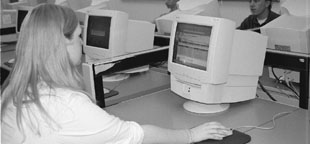By Steven Baker Campus Editor The search for four new deans has been narrowed after a committee composed of faculty, staff and students compiled a list of two to five candidates for each position. This committee is submitting its recommendations for the deans in the College of Fine Arts, M.J. Neeley School of Business, School of Education and the AddRan College of Humanities and Social Sciences to William Koehler, vice chancellor of academic affairs, and Chancellor Michael Ferrari. Koehler said there are certain qualifications for candidates that transcend schools and colleges. "You want someone who is certainly wise, but you have got to have someone who is a good listener and team builder," he said. "However, deans of fine arts and business will need to be the two that would have a greater deal of fund-raising." Depending on each vacancy, the search may or may not include internal candidates from TCU, Koehler said. Of the deans and interim deans currently serving, only one is a women - Rhonda Keen-Payne, dean of the nursing school. Cornell Thomas, special assistant to the chancellor for diversity and community, said he continues to remind the chancellor of diversity issues even though he is continually trying to diversify the faculty, staff and students of TCU. "Diversity is not only the right thing to do to prepare for the global community, it is the key and moral thing to do," he said. "It is important to have experience with different people in all sorts of varying positions. The new vice chancellor of finance and business, Carol Campbell, is a female, and that speaks volumes in itself to his commitment." Koehler said he is aware of the need to increase diversity at higher levels in the university. "As an institution, we are committed to increasing the diversity in the faculty," he said. "We are going to select the individual who can do a very good job for the university." Ferrari said he knows there are women candidates, but he has not been updated on any possible minority considerations. "We are wanting to attract academic leaders with integrity and character who respond to student needs and are sensitive to faculty and staff development," he said. "We are a university on the move, so we are looking for people who can lead us into the future."
Steven Baker
By Reagan Duplisea staff reporter While some people feel the AddRan College of Arts and Sciences split was long overdue, artist Ana England has found a way to unite the two seemingly incongruous subjects of art and science.
England, whose exhibit opened Tuesday in the Moudy Exhibition Hall, said there are some similarities between the art and science fields. "In some way, they are very different," England said. "Scientists have to prove something. I don't. But we both see the world as a wondrous place - that is our point of connection." John Frost, a graduate student in sculpture, said he found it interesting to hear art discussed from a scientific viewpoint. "I've never seen art from a scientific perspective," Frost said. "It was helpful for the scientist to support her thoughts. It gives a realistic approach to her narrative." The exhibit opened with a dialogue between England and Magnus Rittby, chairman of the physics department. The two met four years ago at "Einstein Meet Matisse," an arts and science convention in Belgium. England said Rittby was instrumental in bringing her to TCU. He asked her to send photographs of her work to the art department and personally approached the department about allowing her to exhibit. "Ronald Watson, chairman of the art department, called me and said, 'The physicists really want you to exhibit, but so do we - we love your work,'" England said. Watson said England has done more than 60 exhibits. Her works have been shown from California to Georgia. England, who lives in Ohio, said she was excited to be exhibiting in a new geographical area, which she was able to do through the art department's funding. "I exhibit all over, but it's hard because my work is so heavy," England said. "The TCU art department hired a fine art-handling company. It was a great financial commitment."The title pieces of the exhibit are large, carved plywood bowls surrounding a planet made of ceramic. Rittby said it was these works that caught his attention at the conference where he met England. England said the pieces represent her visualization of how the universe was created. Other pieces in the exhibit include metal sculptures representing molecular structures and ceramic figures of primitive life forms. The exhibit also includes two self portraits, "Self-portrait with Ancestors" and "Deep Sky Object." When England constructed "Self-portrait with Ancestors" - a human figure sculpted out of 900 clay bones based on animal bone structure - she said she had a spiritual experience. "I began thinking about evolution - about how I have an evolutionary relationship with all mammals," England said. Assistant professor of art history Anne Helmreich said she was impressed by how the pieces were constructed. "I had seen her work in photographs before, and I was fascinated with the interdisciplinary nature of her work," Helmreich said. "Once you see the works yourself, you get to appreciate the craftsmanship - the wood in the pieces, the clay bones."
Reagan Duplisea
By Jaime Walker staff reporter
Roger Fisher, director of Residential Services, said TCU works hard to ensure the safety of its residents. "Although this incident is very upsetting, I think the university policies and the buildings themselves are designed with student safety in mind," Fisher said. Fisher said the university policies state that each residence hall is required to have one fire drill per semester, and there should be a fire escape plan posted in each wing. Candles and small electrical appliances, such as popcorn poppers, are not allowed because they pose a fire hazard, according to university policy. "The greatest threat to students, when it comes to fire safety, are students who break the rules," Fisher said. Kerri Haage, a senior marketing major and Jarvis Hall resident, said she is rarely concerned about a fire in the residence hall. "Even during fire drills, I find myself taking my time," she said. "I just never think the drills are that important." Fire drills are an essential part of keeping residents safe, Fisher said. "There is always a concern that students will not take drills seriously, but we also treat our residents as adults," he said. "If they are foolish enough not to leave in a timely manner, that is there own fault." Aggie Alexander, a senior pre-med major and resident assistant in the Tom Brown/Pete Wright Residential Community, said she understands why students are reluctant to follow the rules but thinks it is in everyone's best interest to do so. "For the most part, we are all very responsible, but the rules are still the rules," she said. Haage said students are old enough to make decisions on their own. "Rules are reasonable, but responsible people would not start fires in the first place," she said. "If you want to burn a candle while you are in the room, that should be fine." Alexander said hall meetings emphasize all the rules and clearly outline fire escape plans. "We want our residents to be ready for anything, but nothing ever happens" she said. Alexander said students do not consider fire a real threat. "You just never think that anything serious will happen to you," she said. Fisher said policies, combined with building construction, will do a lot to keep students safe. As the university renovates its buildings, fire safety is a primary concern, he said. Fisher said all new buildings and renovation projects will be equipped with state-of-the-art alarm systems, which include smoke detectors in every public area and private room. Each room has or will have its own alarm, connected to the main electrical circuit. All halls will also be equipped with a sprinkler system. "We would rather clean up water than repair more serious damage," Fisher said. "TCU should be proud that we make such a serious commitment to the safety of our students."
Jaime Walker
By Matt Jones Design/Features Editor Last fall, sophomore Shawna Golden started class just like most other business majors at TCU, unaware that her future degree plan and core curriculum had yet to be written. At the time, Golden said she had heard talk of a new degree plan that would be offered in January 2000. The plan was to develop a program that would help students learn information systems, particularly those dealing with the electronic business of organizations.
On Tuesday, Golden said she finally realized she had made the right decision. She walked into Tandy Hall Room 125 and took a middle aisle seat among about 40 classmates. "I really didn't know what to expect," she said. "It will be interesting to watch as everything moves so quickly." Jane Mackay, director of TCU's electronic business program and associate professor of management information systems, said the degree plan, which will give students a bachelor of business administration with a major in electronic business, will allow Golden and other students to stay on the edge of changing technology and growing job markets. "Business is certainly transcending the Web," Mackay said. "This program will allow students to learn the expertise both in business and the technological skills that are needed to take advantage of this shift in the business world." Nearly 60 students are currently enrolled this semester, and Mackay said more are expected to enroll for the summer session. Mackay said TCU's program for the undergraduate degree in e-business is the first to be accredited by the American Assembly of Collegiate Schools of Business. One program, at Stevens Institute of Technology in New Jersey, offers a similar program, but Mackay said it's not a business school. Chuck Williams, interim associate dean and chairman of the management department, said similar degree programs are generally aimed at graduate students, but TCU is trying to prepare undergraduate students now. "This is clearly the hottest area in business these days," Williams said. "Our program will help students take advantage of these opportunities." One of Golden's classmates, Julie Covert, a junior management and electronic business major, said knowledge and use of computer systems is a must in today's business world. "I believe the skills I learn in this degree program will give me a greater knowledge of how companies are competing with the changing needs of consumers in this new millennium," she said. Covert said completing the degree program will also teach her to understand and improve a company's Web presence while continuing to strengthen traditional business practices. Golden said the degree will offer more than just increased job opportunities. "I am not doing it for the money," Golden said. "I just hope to explore these new and innovating changes in the business world."
Matt Jones |
| The TCU Daily Skiff © 1998, 1999 Credits |
 The artworks in England's exhibit "Spatially
Extended" seem like they come right out of science textbooks or what
can be seen under a microscope.
The artworks in England's exhibit "Spatially
Extended" seem like they come right out of science textbooks or what
can be seen under a microscope. With Wednesday morning's residence hall
fire at Seton Hall University in New Jersey which killed three people,
TCU staff and students are wondering whether they need to be concerned
about a similar incident happening here.
With Wednesday morning's residence hall
fire at Seton Hall University in New Jersey which killed three people,
TCU staff and students are wondering whether they need to be concerned
about a similar incident happening here. In late November, Golden applied to the inaugural class
of electronic business majors and was accepted.
In late November, Golden applied to the inaugural class
of electronic business majors and was accepted.